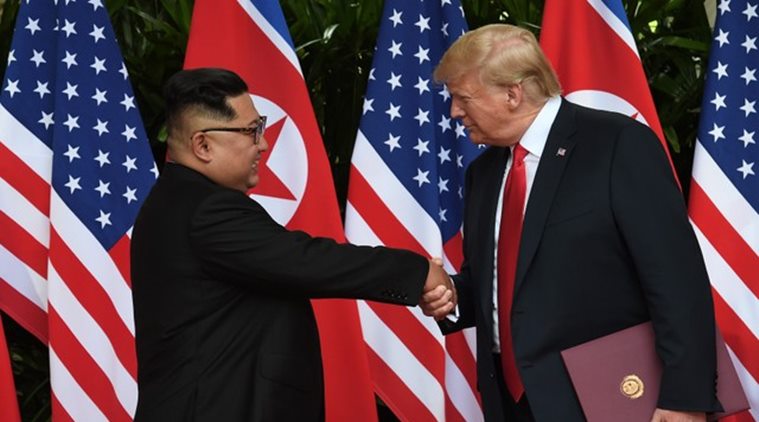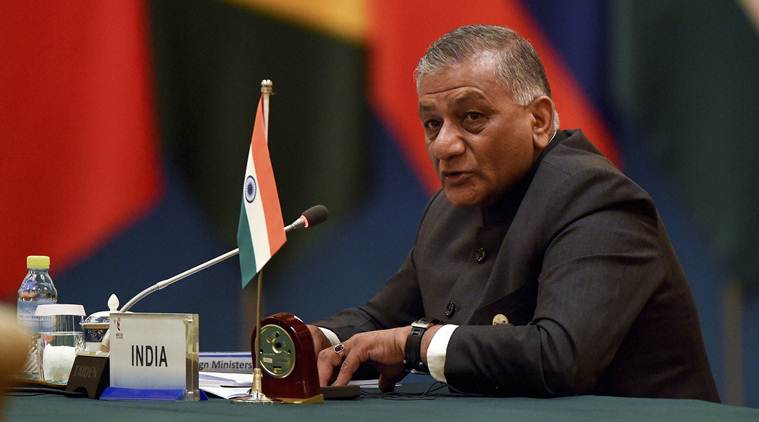Trump-Kim summit: What the handshake in Singapore means for India
Over the years neither has India offered its fullest support to the country on account of the relations necessitated with South Korea and America, nor has it completely alienated itself from the region as a consequence of the troubled relations it shares with Pakistan and China.

As the two leaders came together to make the historic negotiation, the entire world watched with much anticipation. (Anthony Wallace/Pool via Reuters)
US President Donald Trump and North Korea leader Kim Jong Un created history on Tuesday by shaking hands and hence signaling the coming together for the first time in more than half a century of their countries. The US-North Korea summit held in Singapore’s Sentosa Island resulted in the signing of a “comprehensive document” pledging, among other things, complete denuclearisation of the Korean peninsula.
As the two leaders came together to make the historic negotiation, the entire world watched with much anticipation. The two countries have been at loggerheads with each other since the 1950s, when cold war politics resulted in the Korean peninsula being divided between the North and the South. While on one hand, South Korea got into a powerful alliance with America, the North, under Communist influence, became a strong ally of the USSR. In the ensuing years, while the Soviet Union disintegrated, North Korea’s relations with America was primarily marked by an aggressive nuclear weapons programme.
Through these years of conflict between the two countries, India has had a rather curious relationship with North Korea. After the Second World War, when the world split into two with supporters on either the side of America or that of the Soviet Union, India declared its stance of non-alignment. Consequently, it never interfered in the military operations of either of the countries, but it did provide humanitarian aid to North Korea during the war. Over the years though, geopolitics has ensured that neither has it offered its fullest support to the country on account of the relations necessitated with South Korea and America, nor has India completely alienated itself from the region as a consequence of the troubled relations that the latter shares with the neighbouring regions of Pakistan and China. The summit on Tuesday, however, might change much in the space of diplomatic ties between the two countries.
How have India-North Korea relations been historically?
The first time that India and North Korea developed consular relations was in 1962 and in 1973, full diplomatic ties were established between the two countries. “Relations between India and North Korea have been historically positive, marred only by North Korea-Pakistan ties related to missile and nuclear technology. This is principally a reflection of India’s position of strategic autonomy which will not allow another country (read: the US) to determine the shape and form of India’s bilateral relations (at least in theory),” foreign policy expert and Fellow at Observer Research Foundation (ORF), Abhijnan Rej told Indianexpress.com.
India’s commitment to go ahead with diplomatic relations with North Korea is evident from the fact that the former continued to have an embassy at Pyongyang, despite significant pressure from the USA to not do so. “One should also remember that India was for DPRK, till recently, its third largest trading partner,” says Rej. As per government data, in the year 2015-16, Indian exports from North Korea amounted to $111 million, while imports amounted to $88 million.
Further, the Center for Space Science and Technology in Asia and the Pacific (CSSTEAP) located in Dehradun is reported to have been one of the first institutes in the world to have provided technical training to North Korean students, even after the United Nations declared its first set of nuclear sanctions against the country in 2006. In fact, it has been an embarrassment for India that courses offered in the institute directly trained several North Korean applicants in nuclear strategy.
The famine that crippled the North Korean economy in the mid 1990s, continued to plague the nation for a long time, with food shortages being repeatedly reported from there. A lesser known fact, however, is the amount of aid provided by the Manmohan Singh-led government to the peninsula at a time when the country was isolated from practically every other corner. In 2010, reportedly, 900 tonnes of soya beans and 373 tonnes of wheat was sent across to North Korea from India to help revive its food economy.
It was only in 2017 that India’s Ministry of External Affairs, reacting strongly to North Korea’s intercontinental ballistic missile launch, declared a ban on all trade with the region, with the exception of shipments of food and medicine. The declaration brought to an end the long-held trade links between the two countries. The decision to ban trade links with North Korea came at a time when India was increasing its trade links with South Korea.
Most importantly though, North Korea’s consistently growing nuclear aggression was a cause of worry to India in the face of a possible collaboration between Pyongyang and Pakistan. Reportedly, since the 1990s nuclear technology was indirectly transferred between Pakistan and North Korea, and the increased show of nuclear strength on the part of the latter raises concerns for India.
How will the summit at Singapore impact India?
Less than a month before the summit at Singapore was scheduled to be held, India’s Minister of State for External Affairs, V K Singh visited Pyongyang. This was the first high-level visit from India to North Korea in over 20 years. In the coming weeks, New Delhi would be preparing for the visit of South Korean president Moon Jae-in. The meeting between America and North Korea, is being closely watched by New Delhi for the impact it might have on future relations and involvement with North Korea.
While the possibility of a collaboration with Pakistan is foremost on the list of concerns for India when it comes to North Korea’s anticipated denuclearisation drive, a new relationship between Washington and Pyongyang could also benefit India in ensuring a new market in the East Asia. This is significant to the country in the wake of the Modi government’s ‘Act East policy’ that focuses on increasing economic ties between India and its neighbours in the Asia-Pacific region.
However, experts are still unsure of the precise outcome of the summit, making it difficult to foresee an impact it might have on the Indian policy. “It is entirely unclear, going beyond the hoopla, what this summit has achieved beyond a DPRK assurance to commit to “complete denuclearisation” of the Korean peninsula. It is unclear whether the North Korean understanding of ‘denuclearisation’ and that of the US’s match, so Kim’s commitment lacks specificity. In principle, a Korean peninsula free of nuclear weapons contributes to regional stability — and as such will be welcomed by most countries, India included. It is, however, unclear at this stage exactly how far all parties are from that goal,” says Rej.
For all the latest Research News, download Indian Express App
© IE Online Media Services Pvt Ltd
 Less than a month before the summit at Singapore was scheduled to be held, India’s Minister of State for External Affairs, V K Singh visited Pyongyang. AP/PTI Photo (AP6_19_2017_000022A)
Less than a month before the summit at Singapore was scheduled to be held, India’s Minister of State for External Affairs, V K Singh visited Pyongyang. AP/PTI Photo (AP6_19_2017_000022A)





































No hay comentarios:
Publicar un comentario